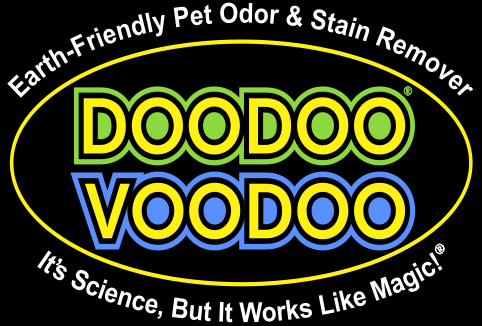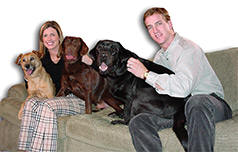|

WELCOME TO
OUR
RAINBOW BRIDGE
PAGE
Here are pictures of some of the wonderful
pets who have enriched our lives, but who have now passed over the Rainbow
Bridge to a friendly, cheerful place where tails are always wagging, there's
always a warm patch of sunshine to lie in and contentment fills the air.
It gives us a lot of comfort to know that someday we'll be back together with
these members of our "Gang of Fur." We're glad to have them in
our lives and look forward to petting them once again someday. Mouse over the
pictures to see the text associated with each of them.
You can see more
photos and read about some of our success stories on the
About Us
page.
"Don't cry
because it's over. Smile because it happened."
─ Dr. Seuss
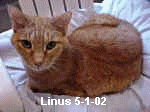 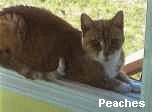
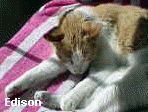
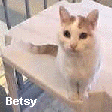
 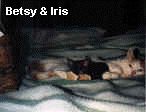
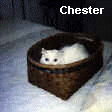 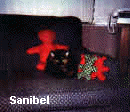
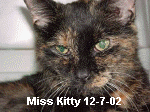 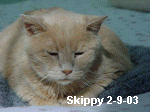
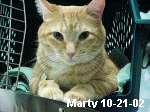
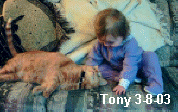 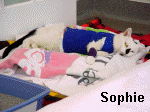
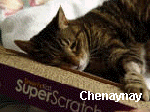
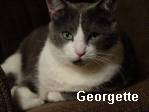 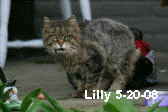
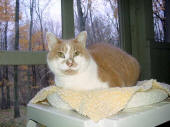

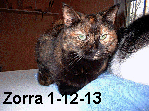

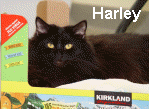
Linus
Linus was our first-ever rescued cat, adopted from the
Humane Society of Indianapolis (where I was later a Board member) shortly after we were married. We chose him out of his
littermates because he was very vocal and climbing the cage to get our
attention. To this day, we believe he knew what am important role he would play
in the world: instigating our being so involved in high-level animal
welfare and doing so much to help so many animals. It all grew out of Linus's being in our lives and we are forever indebted to Linus for this.
When it was time to
have Linus neutered, we took him to the vet's office and took seats in the
waiting area. They told us to go on home and that they'd call us when they
were finished. We couldn't believe it! We told them we could NEVER
leave our little guy there alone. They were very understanding, even
though we now know that they were likely laughing their butts off after we
finally left. Linus did fine and we learned that you aren't supposed to
hang around while your cat is neutered. :-)
We deemed Linus
lonely, so we got a kitten for him and named her Peaches. He HATED Peaches
when we brought her home and over the ensuing weeks he beat the crap out of her repeatedly. It
was so pronounced that I once told the vet that I was concerned that Linus was
literally going to kill Peaches. The vet assured me not...and Linus and
Peaches ultimately became best friends. They would snuggle together the
rest of their lives.
Once he bought into
Peaches, Linus was fine with the arrangement, but later on, when we started
bringing in more and more rescued cats, Linus withdrew. We feel he never
forgave us for messing up his life with so many other cats to distract us from
him and his position of importance.
He developed kidney
disease and spent the last years of his life very, very thin. We
euthanized him here in our rescue facility in the sunroom overlooking the wooded
backyard. We and our caretaker, Carol, cried our eyes out, not only
because of Linus's passing, but because of the enormity of what Linus started.
There are untold
thousands (millions, more likely) of animals who owe Linus a debt of gratitude. He was pivotal and
played a very important role in the world. Now he knows.
Peaches
Wow. What a strong-willed kitty. She was my
original feline girlfriend and would spend hours curled up with me while I
watched television.
We got Peaches as a
friend for Linus (see above). The first time we left her alone with him in
the house so we could go to dinner, we put a little washcloth over her as she
lay sleeping on the corner of a VCR in our living room. She looked like a
little angel. Little did we know that she would grow to be the Rose
Kennedy of our animal population. She absolutely ruled the roost.
We took a trip and
asked our elderly neighbors to feed the two cats while we were gone. When
we checked in from the vacation, the neighbor lady said Linus and Peaches were
doing well, but "Boy, that little one sure gets all the food." This was
likely an attitude she developed after Linus expressed his displeasure at her
coming to live with us by pooping in her food dish.
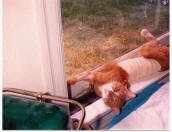 Peaches
developed lipidosis, which is a liver disease cats are prone to when they go a
few days without eating. She nearly died and had major surgery, after
which we had to feed her a special mixture via syringe through her abdominal
feeding tube. It took forever to prepare the mixture each time, then took
forever to slowly infuse the mixture through the tube, lest she would vomit.
This was tough to do around the clock, but it really helped us bond with Peaches
and her with us. She pulled through and lived a long, happy life after
that. (Shown here is a picture of Peaches lying in the window after her
surgery.) Peaches
developed lipidosis, which is a liver disease cats are prone to when they go a
few days without eating. She nearly died and had major surgery, after
which we had to feed her a special mixture via syringe through her abdominal
feeding tube. It took forever to prepare the mixture each time, then took
forever to slowly infuse the mixture through the tube, lest she would vomit.
This was tough to do around the clock, but it really helped us bond with Peaches
and her with us. She pulled through and lived a long, happy life after
that. (Shown here is a picture of Peaches lying in the window after her
surgery.)
Toward the end, she
was losing weight, not wanting to eat and wanting to face away and be by
herself. The tests kept coming back normal, though, and the vets were
stumped. We ultimately decided to do an abdominal ultrasound to see what
we could find. I stood there as they shaved Peaches' side, comforting her
and coaxing her into lying still. Sadly, though, when they shaved her fur,
there was a large, purple area under her skin. It was metastatic cancer,
as a needle aspirate and microscope proved. I could not see trying to keep
Peaches alive out of simple selfishness, so I spent time feeding her and petting
her in her cage at the vet's, but she even tired of me and turned her back to
me, putting her nose into the rear corner of the cage. I knew it was time.
Our main veterinarian, Dr. David Brunner, and I euthanized her while I held her.
I bawled my eyes out...and am tearing up as I type this. I loved Peaches
dearly and was terribly sorry that she had been feeling so poorly.
Peaches and Linus
were very important kitties, as they helped guide us on our lifelong journey of
helping needy animals. Without them, I'm not sure we'd have followed the
same path. We and untold thousands of animals owe them both a large debt
of gratitude for all the joy they gave us and all the good they did.
Lilly
Lilly belonged to a family who lived across the street
from my late father, who lived in the 106-year-old house where I grew up.
While hauling furniture and stuff from Dad's house, I went out into the street
to talk with the neighbor. Lilly followed him out there and she warmed up
to me instantly. I couldn't help but notice how terribly thin she was, so
I asked the neighbor about her health while I looked her over.
He said she'd had a
few teeth removed 7 weeks prior and that her mouth actually seemed to get worse
after that, rather than better. He said the vet had prescribed oral
antibiotics, but that he hadn't been able to get them into Lilly. I looked
at her mouth and immediately suspected sublingual cancer, which we'd seen
before, particularly among cats who lived in smoking households (which Lilly
did). Knowing about our rescue facility and penchant for helping ill
animals, the neighbor asked if we wanted a new "project." After thinking
about it for a few hours, I told him we'd like to take Lilly to our vet for an
examination. He consented, and the next day, a Saturday, while I was at
Dad's house hauling more stuff, Lilly came over to keep me company. After
I finished my work, I scooped her up and she rode home sitting on my lap.
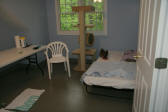 Once
we got her home, we fixed up a three-room suite for Lilly in our rescue
facility. She immediately began chowing down on
Fancy
Feast and
Hill's Prescription Diet A/D, as shown
here. We had already scheduled an appointment with the vet for the
following Monday morning at 8am, so we had a day and a half to get Lilly settled
in. She took to us and her suite right away, but she hadn't yet met any of
the other cats who live in our facility. Once
we got her home, we fixed up a three-room suite for Lilly in our rescue
facility. She immediately began chowing down on
Fancy
Feast and
Hill's Prescription Diet A/D, as shown
here. We had already scheduled an appointment with the vet for the
following Monday morning at 8am, so we had a day and a half to get Lilly settled
in. She took to us and her suite right away, but she hadn't yet met any of
the other cats who live in our facility.
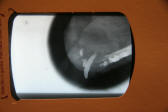 Monday
morning, she was seen by our vet, who, unfortunately, confirmed that Lilly did,
indeed, have oral cancer. Lilly was lightly anesthetized and x-rays were
taken. We were all shocked by what we saw: cancer had eaten away all
of Lilly's lower right and front jawbone. To the left is a picture of the
x-ray (it's oriented funny; her lower jaw is pictured and is pointing toward 8
o'clock). The jawbone was still partially intact on her lower left, as you
can see, but the couple remaining teeth at her lower front were just resting in
cancerous tissue, not bone. Lilly tested negative for FIV and FeLV, as
well as intestinal parasites. We treated her with Capstar and Revolution
so she wouldn't infest the rest of our population with fleas. Monday
morning, she was seen by our vet, who, unfortunately, confirmed that Lilly did,
indeed, have oral cancer. Lilly was lightly anesthetized and x-rays were
taken. We were all shocked by what we saw: cancer had eaten away all
of Lilly's lower right and front jawbone. To the left is a picture of the
x-ray (it's oriented funny; her lower jaw is pictured and is pointing toward 8
o'clock). The jawbone was still partially intact on her lower left, as you
can see, but the couple remaining teeth at her lower front were just resting in
cancerous tissue, not bone. Lilly tested negative for FIV and FeLV, as
well as intestinal parasites. We treated her with Capstar and Revolution
so she wouldn't infest the rest of our population with fleas.
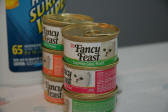 Over
the coming days, we had her back at the vet for further examination and a bit of
a shave below her chin so she wouldn't drag her (long) fur so much in her food,
which she licked at with reckless abandon. We were amazed by her appetite;
she was eating about 2.5 cans of wet food a day. Her weight was at 5# 3oz.
Due to having no functional teeth to speak of and due to her mouth being so full
of cancer
(click here for pictures of the inside of Lilly's mouth;
they're a bit graphic...and very sad), she could only eat the
most pureed types of Fancy Feast and some prescription A/D. To make it
even easier on her, we added extra water, which helped the food go down easier
and got her some much-needed hydration. Lilly's favorite flavor & texture
of Fancy Feast was Chopped Grill Feast. We'd sit right there with her and
fluff the food up every couple minutes, all while telling her what a good eater
she was and how proud we were of her. (We've done this with innumerable
cats and have found that it does a lot of good at encouraging them to eat more.) Over
the coming days, we had her back at the vet for further examination and a bit of
a shave below her chin so she wouldn't drag her (long) fur so much in her food,
which she licked at with reckless abandon. We were amazed by her appetite;
she was eating about 2.5 cans of wet food a day. Her weight was at 5# 3oz.
Due to having no functional teeth to speak of and due to her mouth being so full
of cancer
(click here for pictures of the inside of Lilly's mouth;
they're a bit graphic...and very sad), she could only eat the
most pureed types of Fancy Feast and some prescription A/D. To make it
even easier on her, we added extra water, which helped the food go down easier
and got her some much-needed hydration. Lilly's favorite flavor & texture
of Fancy Feast was Chopped Grill Feast. We'd sit right there with her and
fluff the food up every couple minutes, all while telling her what a good eater
she was and how proud we were of her. (We've done this with innumerable
cats and have found that it does a lot of good at encouraging them to eat more.)
Lilly began to get a
bit stir crazy and wanted out of her suite, so we let her out and, boy, was she
in for a rude awakening: there were two dozen other cats in the building!
She did a lot of growling and hissing, but we comforted her and she slowly
warmed up to the other cats. She even was spotted lying right next to
another kitty on a ledge on the screened porch overlooking the backyard where
the
deer graze. We were amazed at this
boldness on her part, but we were also amazed at how the other cats never hissed
back or showed any aggression toward her. It was as if they knew that she
was gravely ill. We'd let Lilly back into her suite and would lie with her
for, sometimes, hours, but then she'd want out and would go socialize with the
other cats and explore the facility some more. She was a very self-assured
kitty.
 At
night, we'd lie with her, watching the evening news and some other programs or
reading. She absolutely loved this time and would purr and purr, then curl
up on you and fall sound asleep, often with her nose virtually touching yours.
It is such a pleasure to see an ill kitty relax to the point of being able to
fall deeply asleep. (Many gravely ill cats never do sleep; they spend
their time huddled in discomfort.) We'd either sleep with her in the
suite, or would shuttle her over to another bedroom in our house. Pictured
here is Lilly perched on her cat tree. She loved doing this, as it allowed
her to survey our acres of backyard and woods. We have lots of wildlife
here, which she loved watching. (Here's a picture of a
deer grazing in our woods Lilly's last day
and a picture of "Mr.
and Mrs. Duck," our every-Spring visitors, floating in our little
pond.) Lilly was great to sleep with. Despite being so active (we
called her Monkey Girl), she didn't climb on you at night or do anything to
disturb you. She'd curl up on her fleece or in her poofy bed and fall
soundly asleep. At
night, we'd lie with her, watching the evening news and some other programs or
reading. She absolutely loved this time and would purr and purr, then curl
up on you and fall sound asleep, often with her nose virtually touching yours.
It is such a pleasure to see an ill kitty relax to the point of being able to
fall deeply asleep. (Many gravely ill cats never do sleep; they spend
their time huddled in discomfort.) We'd either sleep with her in the
suite, or would shuttle her over to another bedroom in our house. Pictured
here is Lilly perched on her cat tree. She loved doing this, as it allowed
her to survey our acres of backyard and woods. We have lots of wildlife
here, which she loved watching. (Here's a picture of a
deer grazing in our woods Lilly's last day
and a picture of "Mr.
and Mrs. Duck," our every-Spring visitors, floating in our little
pond.) Lilly was great to sleep with. Despite being so active (we
called her Monkey Girl), she didn't climb on you at night or do anything to
disturb you. She'd curl up on her fleece or in her poofy bed and fall
soundly asleep.
Sadly, but luckily
acutely, Lilly's breath began to get extremely odorous. Her mouth swelled
dramatically more. She lost interest in eating, likely due to the pain and
the constriction of her mouth and throat from the cancer. She lost 4oz. in
one day, even after eating a can of food and not having a bowel movement.
Cancer was stealing all her nutrition. This was all bad enough, but what
really let us know that she was in significant distress was that she began to
pace constantly and yowl and cry. Not a playful kitty type of cry; a
guteral, agonal cry that cats reserve for when they're really hurting. We
believe her constant pacing (more like racing around the facility, at times) was
due to her searching for a way out. As you know, animals often will go off
to be alone to die; we believe this is what Lilly was trying to do. We
never let our rescued animals outside, but we have no doubt that if we had let
her out, Lilly would have run and we'd have never seen her again.
We took Lilly to our
veterinarian to be euthanized, which she was at 5pm on May 20th, 2008. We
held her on our lap in the poofy bed she loved and covered her with a towel to
keep her warm. Her euthanasia went off without a hitch. Totally
peaceful passing. After Lilly passed away, we took the pictures of her
mouth. We hope these pictures help others keep their pets from getting
oral cancer (see further info below).
(We prefer to
euthanize animals via the two-injection method, not the single injection some
people use, which we find cruel. The first injection is a large dose of
sedative and is given I.M. (intra-muscular). The body absorbs the sedative
slowly, in anywhere from 2 to 15 minutes, and the animal falls deeply asleep.
Once the animal is deeply, deeply under (as evidenced by their extremely
intermittent breathing), the veterinarian finds a vein and administers the fatal
injection. Due to the animal being so far under the anesthesia, this
second injection is much less traumatic, if you know what I mean. We do
not prefer the cardiac stick or the single-injection methods of euthanasia, as
we find them cruel.)
I told my wife,
while we were waiting for the sedative injection to take effect (which it did in
about 2 minutes in Lilly's case) that we had packed a lifetime of love for Lilly
into the 11 days we'd cared for her at our home. We learned so much about
grace and poise from Lilly. I'm not sure we could ever be as brave as she
was during her ordeal. We always said that Sophie (below) had the best
demeanor of any cat we've had in our care (which has been hundreds), but we now
believe that Lilly has taken that crown from Sophie. What an incredible
cat. It was necessary, but difficult, to euthanize her, as she was still
in many ways acting like a normal cat. (This isn't without precedent,
though; cats are renowned for hiding their infirmities; this is their way of
protecting themselves from predation in the wild. It's not uncommon for
dying cats to appear in many ways to be normal and healthy.) It was an
incredible honor to get the opportunity to care for Lilly. She has
enriched our lives and will live on in our hearts forever.
Cats who live in
smoking households are, according to veterinary literature, nearly 6X as likely
to develop oral cancer (if they are subjected to secondhand smoke for 5 years).
This is because the smoke settles on their fur, then is ingested and deposited
in their mouths as they groom themselves.
Click
here for an article out of a veterinary journal about cats and oral cancer.
(The file is in PDF format and is just over a megabyte in size, which may take
awhile to download if you have a slow connection.) Cats in smoking
households are also at increased risk of developing lung cancer. If you
smoke, we urge you to please stop, for your own sake and the health of the pets
you love.
Here are more
pictures from Lilly's time with us at our facility and just before she joined
us. Mouse over the pictures to see descriptive text, where applicable.
Click a picture for an 800x600 version:
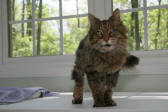
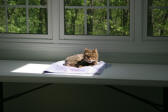
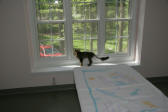
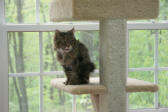
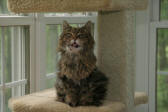
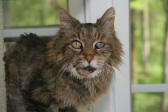
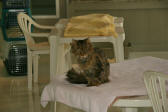
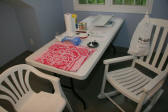

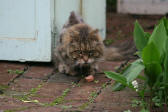
Georgette
Georgette was one of our rescued housecats and passed away from metastatic cancer on November 16, 2006.
You can read her
life story and see photos here. There is helpful
information about what we learned medically from Georgette's battle with cancer.
You can see a recent ad featuring Georgette
here.
Betsy
Betsy was found living on top of a high-rise apartment
building in downtown Indianapolis by a gal my wife worked with. The gal
had feeding Betsy canned green beans and whatever else Betsy would eat. As
soon as my wife heard about Betsy's situation, she immediately went over there
and brought Betsy home. We named her Betsy because she was found on
election day; this was a nod to Betsy Ross. Betsy loved us, but was
terribly terrorized by our other rescued cats; they beat her up day and night,
poor thing. Because of this, she for years lived under a footstool and in
a cardboard box we set up for her. We thought Betsy could use a buddy and
that it might draw her out, so we got a kitten, Iris, to be Betsy's buddy.
They took to each other literally immediately, as shown in the photo above.
As she grew, Iris sort of branched out and quit being so close to Betsy, but we
feel their friendship was helpful to Betsy while it lasted. Toward the end
of her life, Betsy got some braveness and even was once seen curled up with
Edison, who was the main cat who beat up on Betsy. She developed a variety
of maladies and lost her sight at the end of her life. The last hour she
was alive, even though she was so terribly ill in so many ways, she struggled to
get off the mattress we were lying on with her on the floor and stumbled her way
to the litter box to pee, then came back to the mattress to be with us. We
hope Betsy now knows how hard we tried to give her a good quality of life.
We love her dearly.
Mario
Mario
was an extremely
friendly
guy
who
just
showed
up
on
our
property
one
day
and
was with us
ever
since. We wished that a forever home would have materialized for
Mario, but he was such a sweetheart to have around that we consider ourselves
lucky to have had the pleasure of caring for him.
Mario's claim to
fame is that we
never
heard
him
meow
like
you'd
expect
him
to...he
sort
of
grunted instead and it was really cute. Mario was one of those instantly likable cats,
and we loved having in our population.
Before we knew how
friendly Mario was, he was eartipped as a feral cat (for
identification in the wild). He wore his tipped ear like a
badge of honor.
We adopted Mario to what
we thought was a really good home once, but he ended up coming back
to us through no fault of his own. His then mom reported to us
that he had a really scary incident she called "asthma," but that he
came out of it after emergency care. That's all I remember
about the incident, but I believe it may have been more than
that...or that something about it would come back to haunt Mario.
Mario had sporadic
vomiting for years, but all the diagnostics never really showed
anything. Then, at one exam, he exhibited a very rapid
heartbeat. Given that he never was stressed, even at the
vet's, we kind of wondered what was up with his tachycardia, but the
vet didn't seem too worried by it. At a subsequent exam, I
seem to recall that his heart rate seemed more normal, so we figured
that the previous tachycardia was an aberration. The vet said
she wasn't concerned and that his heart rate seemed normal. Well...
We then began to note that Mario was
losing weight, but otherwise seemed himself. This persisted a
few months. His sporadic
vomiting was no different, so we just kind of kept a closer eye on
him.
Then, one day one of our
cattery caretakers didn't see Mario in his normal spot and he wasn't
following her around, so she went looking for him. She found
him in a room of the facility where he never really went, hunkered
down and having extreme difficulty breathing. She let us know
and we immediately rushed him to the nearest
emergency clinic. After
getting him into an oxygen cage and loading him with sedatives, they
did all sorts of tests, including x-rays and an emergency cardiac
ultrasound, which was difficult as heck, given his inability to
breathe correctly. They did the ultrasound super-quick, and it
actually didn't show anything remarkable. We had an intense
discussion about everything Mario's condition could be, and none of
the possibilities was any good for him. His breathing became
even more labored, even with more sedation, and we agreed that the
only humane thing to do was to euthanize the poor little guy.
We had Mario's body sent
to a top veterinary school for a post-mortem exam so we could learn
from his passing in an effort to help other animals in the future.
Sigh. It turned out that Mario's death likely could have been
prevented, if only we had known. He was suffering with
advanced cardiomyopathy, which is a thickening of the heart wall
that causes insufficient blood-pumping ability. His heart was
failing to such a degree that he wasn't getting enough blood pumped
through his lungs to exchange old air for new. If he had given
us enough symptoms to lead us, we would have had him cardiac
ultrasounded months prior, would have found out that he had
cardiomyopathy and would have immediately started him on
prescription medications and supplementation. But we didn't
know, and the vet never picked up on it. Aside from his weight
loss, Mario totally hid his illness. Up until minutes before
he began to have labored breathing, he acted absolutely normal.
Here's what we learned.
If a
cat is having weight loss over a period of months, get some
ultrasounds and other tests done. Weight loss doesn't occur
for no reason. And if we ever see a heart rate abnormality in
a cat again, you better believe we'll follow up on it.
Here's to Mario.
We should all have his love of life, his easygoing demeanor and his
"I'm good" spirit.
Sophie
After we
rescued
Skippy
(below),
he was the
odd man
out in our
rescue
population
and he
needed a
buddy.
Julie
happened
to be
looking
through a
northside
paper and
saw an ad
for some
kittens.
She called
the number
and the
fellow
told her
that the
only
kitten
left was
the runt
of the
litter,
wasn't
very cute
and he was
sure she
wouldn't
want
him.
Julie
said,
"We'll
take
her!"
The guy
brought
the kitten
to us, we
named her
Sophie and
she and
Skippy
became
instant...and
lifelong...friends.
Sophie
had easily
the best,
most
positive
attitude
of any cat
we've ever
had.
She was
rarely
sick and
when she
was, it
didn't
seem to
affect her
like it
does other
cats.
She
would
often dig
at your
hair or
jump on
your back
if you
were bent
over
scooping
the
litterboxes.
Sophie's
only bad
habit, if
you can
call it
that, was
that she
got
terribly
upset if
she had to
ride in
the car
and she
would
virtually
always
vomit...sometimes
even
before you
started
the
car.
We don't
know if
this was
because of
apprehension
over going
to the vet
or
apprehension
about the
motion of
the car,
but she
never
failed to
get
sick.
Interestingly,
at the end
of her
life we
shuttled
her to the
vet's and
the
surgeon's
many times
and she
never once
vomited.
The Lord
works in
mysterious
ways.
When
we lived
in Florida
in the
late '80s,
there was
a frog on
the side
of our
screened
entry way
waiting
for the
evening's
bugs to
come
around the
light and
Sophie,
uh, took a
liking to
that
frog.
She sat
there on
the floor
below the
frog for
hours just
looking up
at
him.
After a
long time
thinking
about it,
Sophie
launched
vertically
and almost
got the
frog...who
was over
six feet
up on the
wall!
Sophie
was always
the
"nurse"
of our cat
population
and could
be counted
on to
comfort
and give a
bath to
any of the
other cats
she felt
needed
it.
As shown
below in
the
picture I
took of
Sophie and
Skippy on
the day
Skippy was
euthanized,
she was a
giver 'til
the very
end.
 Sophie
had gotten
thin and
had begun
to sleep a
lot of the
time, so
we took
her to the
doctor.
Having had
experience
with such
things,
Julie
requested
an
ultrasound
of
Sophie's
heart,
thinking
that
Sophie
might be
suffering
from
cardiomyopathy.
The
cardiac
ultrasound
didn't
show what
we
expected,
but they
went a bit
further
and saw
something
in
Sophie's
lung.
An x-ray
clearly
showed a
mass, so
they
performed
a needle
biopsy and
the
pathologist
diagnosed
the mass
as
cancer.
We made an
appointment
to take
Sophie to
the
surgeon's
for a
consult.
Julie
began to
sleep on
the air
mattress
with
Sophie and
fed Sophie
every
couple
hours
around the
clock.
For
awhile,
Sophie
took to
all the
food and
water with
lots of
gusto.
Julie also
gave
Sophie
numerous
subcutaneous
fluid
injections
to help
keep
Sophie
hydrated
and to
keep her
more
comfortable. Sophie
had gotten
thin and
had begun
to sleep a
lot of the
time, so
we took
her to the
doctor.
Having had
experience
with such
things,
Julie
requested
an
ultrasound
of
Sophie's
heart,
thinking
that
Sophie
might be
suffering
from
cardiomyopathy.
The
cardiac
ultrasound
didn't
show what
we
expected,
but they
went a bit
further
and saw
something
in
Sophie's
lung.
An x-ray
clearly
showed a
mass, so
they
performed
a needle
biopsy and
the
pathologist
diagnosed
the mass
as
cancer.
We made an
appointment
to take
Sophie to
the
surgeon's
for a
consult.
Julie
began to
sleep on
the air
mattress
with
Sophie and
fed Sophie
every
couple
hours
around the
clock.
For
awhile,
Sophie
took to
all the
food and
water with
lots of
gusto.
Julie also
gave
Sophie
numerous
subcutaneous
fluid
injections
to help
keep
Sophie
hydrated
and to
keep her
more
comfortable.
The
surgeon
examined
Sophie and
shot more
x-rays.
It was his
opinion
that the
tumor was
primary,
i.e., not
metastasized
from
another
location,
and that
he could
remove it
and the
surrounding
lung lobe
with good
success.
So, Sophie
underwent
a
lobectomy.
Unfortunately,
while
being
intubated
for her
surgery,
the
doctors
found a
mass at
the base
of
Sophie's
tongue,
which they
subsequently
removed
and sent
to the
pathologist
with her
lung
tissue.
Sophie
seemed to
recuperate
well for a
few days,
but then
began to
decline
and her
belly got
quite
distended,
so we took
her back
to the
surgeon,
who
inserted a
needle to
see if
there was
fluid that
needed to
be
drained.
It
appeared
that there
wasn't, so
everyone
kind of
scratched
their
heads.
The
pathology
results on
Sophie's
sublingual
mass
didn't
come back
from the
lab in a
timely
fashion
and Sophie
had begun
to refuse
food and
water,
even when
forced-fed,
so we had
the
surgeons
insert a
feeding
tube.
Unfortunately,
while they
were
finishing
up the
procedure,
the
pathology
results
arrived
via fax
and
contained
the worst
possible
news.
Sophie's
sublingual
tumor was
the most
aggressive,
fastest
growing
type of
cancer and
the tissue
showed
that the
surgeon
hadn't
gotten all
of the
cancer.
Her lung
tumor was
also more
dangerously
and
aggressively
cancerous
than first
thought.
After
Sophie
awakened
from this
surgery,
we took
her
home.
She
continued
to refuse
food and
water...and
even the
NutriCal
she had
previously
lapped up
like
butter...and
she
continued
to
decline.
It quickly
became
obvious to
us that
not only
was Sophie
not ever
going to
get
better,
she really
was
feeling
like crap
and was
ready to
move
on.
So, I
slept with
her on the
air
mattress
and spent
most of
the night
with her
curled up
in my
armpit
while I
petted and
talked to
her.
(She had
lost her
hearing in
the
previous
few
months,
but would
still
respond to
the lowest
tones of
your voice
if you got
right up
to her
ear.)
She would
intermittently
fall
asleep,
luckily,
and sleep
soundly
and when
I'd pet
her she'd
instantly
purr
loudly, so
I knew she
was taking
comfort in
having me
with her.
At
7:45am we
euthanized
Sophie at
one of our
favorite
veterinary
clinics.
Because of
the
pre-euthanasia
sedation
that was
given to
put her
deeply
asleep
before the
euthanasia
injection,
her body
relaxed to
the point
that it
released
all the
stuff that
had been
pent up in
her
digestive
tract.
It was
painfully
obvious
why she
had begun
to refuse
food and
water.
Luckily,
this
release
was mostly
reflexive
and when
it was
over,
Sophie was
deeply
asleep.
The
veterinarian
administered
the lethal
injection
Sophie had
been
longing
for, and
Sophie's
hurting
was over.
We
have
nothing
but fond
memories
of Sophie
and her
loss is
really a
tough one
for
us.
If we
could have
known that
the mass
in her
mouth was
cancerous
and so
aggressively
so, we
wouldn't
have put
her
through
the
lobectomy
or the
subsequent
surgery to
insert a
feeding
tube
(which we
never even
got to
use).
But Sophie
had more
to teach
and we
more to
learn.
Despite
what it
became
obvious
Sophie had
been
holding
inside
her, she
never
vomited at
home, at
the vet's
or during
all the
car rides
in her
last
couple
weeks of
life here
on
Earth.
She purred
at our
touch literally
until the
moment the
sedation
injection
took
effect.
She never
lost her
ability to
use the
litterbox
or to jump
up onto
the air
mattress.
We've
been
through
the loss
of many
dear pets
and the
loss of
Sophie
definitely
ranks near
the top of
the list
of those
that were
most
difficult
for
us.
We love
her dearly
and are
glad that
she'll
never,
ever, hurt
again.
God bless
her.
As
James
Ingram
sang in
his song There's
No Easy
Way,
"Sometimes
the best
is no damn
good."
By
the way,
we believe
there is a
chance
that
Sophie's
demise was
related to
environmental
factors as
discussed
in our
document
Household Chemicals, Environmental Contaminants & Dead Cats.
For the
sake of
your
animals
and others
you come
in contact
with,
please
read it.
(Sophie's
pictured in the gallery at the top of the page
recuperating
the day
after her
lung lobe
was
removed.
Notice
that her
chest
drainage
tube was
still
inserted
and can be
seen just
behind her
bandage.
She is
pictured
under her favorite blanket
during the
prime of
her life
in
December
2000.)
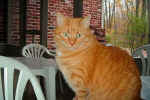 Tony Tony
Our dear
friend,
Tony, passed
away on
March 8th
of
2003.
Tony
showed up
at our
farm
outside
Fishers a
few years
ago and I
found tiny
little
Tony
sitting on
the hood
of my car
meowing
his head
off.
He was soooooo
cute and
friendly
that he
instantly
made a
place for
himself in
our hearts
and in our
cat
population.
Tony was
one of the
most
loving
cats we've
ever had
the
pleasure
of
knowing.
He never
met a lap,
a person
or a meal
he didn't
like!
We adopted
Tony to a
nice gal
on the
near north
side of
Indy
awhile
back, but
her
schedule
changed
and she
wasn't
able to
spend as
much time
with Tony
as she
previously
had, so
Tony came
back to us
and fit
right back
in to the
population.
Tony was
always
happy and
healthy
and we
adopted
him to a great
couple on
Indy's
northeast
side
around
Christmas
of
2002.
Unfortunately,
during
March of
2003 Tony
suddenly
became ill
with what
appeared
to have
been
neurological
symptoms.
His new
family
spoon fed
him and
helped him
to the
litterbox
for a few
days, but
Tony took
an acute
turn for
the worse
and
suddenly
passed
away as
the family
rushed him
to an area
clinic.
A
post-mortem
exam
showed
nothing
amiss, but
given that
Tony had
been so
healthy
'til
then...and
given his
symptoms'
similarity
to those
of Chester
and Iris
(see
this
document
for more
specifics),
we believe
there's a
chance
that
somehow
Tony's
demise
could
possibly
have been
related to
the other
cats'.
As you can
imagine,
we're
still in
absolute
shock at
Tony's
rapid
decline
and
passing.
We and his
adoptive
family are
glad to
have had
Tony in
our lives,
though
obviously
for not
nearly as long as
any of us
would have
liked.
By the
way, as
you can
see from
one of
Tony's
last
pictures
above, he
didn't
always
remain
"tiny
little
Tony"
and we
often
joked that
for Tony,
every day
was Fat
Tuesday.
Skippy
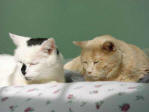 We
rescued
Skippy
while we
owned and
operated a
Jack's
Pizza
outlet in
Fishers (north of Indianapolis) in
1987.
Skippy was
a
polydactyl
kitty
(like
Hemingway's
cats, he
had extra
toes) who
just came
around our
pizza
place...and
was with
us ever
since.
Skippy was
a really
friendly
cat; he
was the
first one
people---especially
children---would
gravitate
to when
they
visited
us. We
rescued
Skippy
while we
owned and
operated a
Jack's
Pizza
outlet in
Fishers (north of Indianapolis) in
1987.
Skippy was
a
polydactyl
kitty
(like
Hemingway's
cats, he
had extra
toes) who
just came
around our
pizza
place...and
was with
us ever
since.
Skippy was
a really
friendly
cat; he
was the
first one
people---especially
children---would
gravitate
to when
they
visited
us.
After
we moved
to Florida
in 1987,
Skippy
(who was
quite a
door-dasher
for
awhile)
sneaked
out into
our
attached
garage,
unbeknownst
to
us.
Later that
day, Julie
went out
into the
garage
only to
find
Skippy
virtually
lifeless.
(We
subsequently
figured
out that
while in
the garage
he had
gotten
into a
litterbox
Julie was
disinfecting
with Lysol
liquid;
the
cleaning
fluid had
burned his
paws and
when he
licked
them, he
got
poisoned.)
She drove
Skippy at
high speed
to an
emergency
clinic in
Ft. Myers
and thanks
to their
treatments
of
activated
charcoal,
fluids and
lots of
TLC,
Skippy
pulled
through.
Sometime
later,
Skippy
developed
bad renal
trouble
and had a
surgery to
enlarge
the
opening
through
which he
urinated.
This
helped him
quite a
bit, but
he always
sprayed
after
that.
Like
many aging
cats,
Skippy
developed
renal
insufficiency,
so for
some years
he ate
Hill's
Science
Diet K/D
and
received
regular
subcutaneous
injections
of
fluid.
The fluids
really can
help make
a renal
kitty feel
better...and
in
Skippy's
case, the
extra
fluids
helped us
always
know when
he'd
sprayed in
our
facility
(due to
the extra
fluid
volume)!
Late
in his
life,
Skippy
developed
diabetes
and was on
insulin
twice a
day.
For a few
years we
were able
to
regulate
his blood
sugar with
insulin,
but toward
the end,
his
glucose
levels
were
extremely
erratic.
A few
times we
found him
catatonic
&
confused
from
hypoglycemia
(low blood
sugar) and
had to
rush him
to the
emergency
clinic for
fluids and
karo
syrup.
We
helped
Skippy
live as
long and
with as
good a
quality of
life as
possible
for many
years, but
near the
end he
just began
lying in
one
position
for long
periods of
time with
his eyes
almost,
but not
quite,
closed.
It became
obvious at
the very
end that
he just
couldn't
get
comfortable
and felt
like crap
all the
time, so
we knew it
was time
for us to
give him
the only
remaining
gift we
could.
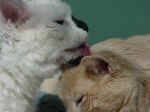 We
held
Skippy on
our laps
facing a
window
that was
looking
out onto a
pretty
day.
We talked
to him and
about him
for the 15
minutes or
so it took
him to
gently
fall
deeply
asleep
from the
intra-muscular
injection
of a
cocktail
of
anesthesia
agents the
vet gave
him.
When he
was really
deeply
asleep,
the vet
gave him
an
intravenous
injection
the ended
his
life...and
his
suffering. We
held
Skippy on
our laps
facing a
window
that was
looking
out onto a
pretty
day.
We talked
to him and
about him
for the 15
minutes or
so it took
him to
gently
fall
deeply
asleep
from the
intra-muscular
injection
of a
cocktail
of
anesthesia
agents the
vet gave
him.
When he
was really
deeply
asleep,
the vet
gave him
an
intravenous
injection
the ended
his
life...and
his
suffering.
Skippy
had 18+
good years
and, boy,
did he
live 'em!
(Shown
at the
right is a
picture of
Skippy's
best
friend,
Sophie,
giving him
one last
bath on
the day he
went over
the
Rainbow
Bridge.
Little did
we know at
the time
that
Sophie had
lung and
oral
cancer and
would join
Skippy
just over
a month
later. Her oral cancer wasn't found until they intubated her for her lung
surgery.)
Miss
Kitty
This
often
misunderstood
girl
passed
away
12-7-02
from renal
failure.
She was
the sister
of Edison
&
Sanibel
(pictured
above) and
was born
in the
Spring of
1987 right
before we
moved to
Florida.
The
siblings'
mom,
Dixie, for
whom we
ultimately
found a
home in
Florida,
had hung
around one
of our
businesses
and when
we sold
the
business
in late
'86, we
decided to
take her
home to
live with
us.
Well,
things
didn't go
as
planned.
I trusted
myself to
take Dixie
to our
Broad
Ripple
home loose
in the
van, not
in a pet
carrier.
Unfortunately,
when I
pulled
into the
driveway
&
gathered
her up,
she
scratched
at me,
jumped
from my
arms and
bolted
away.
I tried
for hours,
even with
Julie's
help
later, to
scour the
neighborhood
looking
for Dixie,
but to no
avail.
We then
made up
flyers and
put them
on all the
doors
within
about half
a mile in
each
direction,
but no one
ever
called to
tell us
they had,
or had
seen,
Dixie.
Naturally,
we were
heartbroken.
We had a
personalized
collar and
tag
waiting
for her at
home and
had even
already
made a
spay
appointment
for
her...but
now she
was gone
and I was
beating
myself up
over being
dumb
enough not
to put her
in a pet
carrier
AND then
let her
get away.
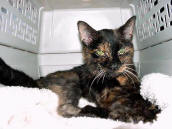 Months
passed
until one
morning
when I was
getting
ready to
drive to
Florida to
scout for
a job and
a house in
preparation
for our
move
there.
Julie had
gone to a
24-hour
convenience
store to
get a bag
of ice for
my cooler
(Julie
always
makes me
cheese
&
banana
pepper
sandwiches
on rye
when I
travel;
you should
try them
with
Durkee's
sauce some
time) and
on her way
saw a cat
far down
the road
from the
convenience
store.
Out of
habit,
Julie
drove down
that way
and as she
approached
the kitty,
she
recognized
the kitty
as
Dixie!
Even
though it
was early
morning,
Julie got
out and
began
knocking
on doors
until she
found a
lady who
said that
Dixie had
been
hanging
around
& that
the lady
had been
feeding
her...and
her
kittens!
OH
NO!
It was bad
enough to
let an
unspayed
cat jump
from my
arms and
get
away...but
now she'd
given
birth to
kittens!?!
Imagine
how we
(and
specifically,
I)
felt!
Well,
Julie
explained
the
situation
to the
lady,
gathered
up Dixie
& the
kittens
and
brought
them home
with her. Months
passed
until one
morning
when I was
getting
ready to
drive to
Florida to
scout for
a job and
a house in
preparation
for our
move
there.
Julie had
gone to a
24-hour
convenience
store to
get a bag
of ice for
my cooler
(Julie
always
makes me
cheese
&
banana
pepper
sandwiches
on rye
when I
travel;
you should
try them
with
Durkee's
sauce some
time) and
on her way
saw a cat
far down
the road
from the
convenience
store.
Out of
habit,
Julie
drove down
that way
and as she
approached
the kitty,
she
recognized
the kitty
as
Dixie!
Even
though it
was early
morning,
Julie got
out and
began
knocking
on doors
until she
found a
lady who
said that
Dixie had
been
hanging
around
& that
the lady
had been
feeding
her...and
her
kittens!
OH
NO!
It was bad
enough to
let an
unspayed
cat jump
from my
arms and
get
away...but
now she'd
given
birth to
kittens!?!
Imagine
how we
(and
specifically,
I)
felt!
Well,
Julie
explained
the
situation
to the
lady,
gathered
up Dixie
& the
kittens
and
brought
them home
with her.
We
took Dixie
and the
kittens
with us to
Florida
and were
able to
find a
good home
for Dixie,
but kept
the three
kittens.
The
kittens
never were
very
healthy;
Edison had
only one
functional
kidney and
needed
quite
extensive
reconstructive
renal
surgery to
save his
life,
Sanibel
fought
inflammatory
bowel
disease
and Miss
Kitty also
had only
one
functional
kidney.
Edison's
one kidney
finally
gave out,
as did
Miss
Kitty's.
Toward
the end of
her life,
Miss Kitty
suffered a
severely
broken leg
and
required a
4+ hour
surgery to
repair
it.
She lost
her
hearing
and would
often
startle
when you
finally
entered
her field
of
vision.
She loved
to eat
"special"
food with
some of
our other
special-needs
cats twice
a day and
really was
quite
herself
until two
days
before she
needed to
be
euthanized.
Miss
Kitty,
like many
cats,
loved to
shove her
nose into
your
armpit or
into the
little
area
between
your thumb
&
forefinger
when you
made a
fist.
She did
NOT like
to go to
the vet
and often
made a
LARGE
scene...to
the point
that one
of the
most
gentle
&
patient
veterinary
technicians
we know
told us
that Miss
Kitty was
the only
cat in the
world who
scared
her.
Miss
Kitty's
kidney
gave out
and she
got so
dehydrated
that the
veterinarian
couldn't
get a
needle
into her
vein to
euthanize
her, so we
ended up
giving
Miss Kitty
an
injection
of Telazol
in what
little
muscle she
had left
(she was
down to 6
pounds) in
order to
sedate her
enough to
euthanize
her.
Telazol
takes a
few
minutes to
sedate a
kitty, so
during
this time
we petted
&
talked to
Miss Kitty
and she
even ate a
few bites
for
us!
Luckily
the
Telazol
took
effect
over the
course of
five
minutes or
so and
Miss Kitty
slowly
stopped
eating and
just went
deep
asleep.
At that
point the
vet was
able to
give Miss
Kitty her
euthanasia
injection
in a vein
in her
back leg
and she
gently
passed
away.
It
was
terrible
that Miss
Kitty had
to go
through
such a
long leg
surgery to
repair her
broken
bone, but
she
actually
was
recovering
quite
well, had
largely
regained
her use of
the leg
and was
due to go
back to
the vet
three days
hence to
have her
leg
checked.
Her
surgery
was almost
a
blessing,
though,
because it
made Miss
Kitty
really
appreciate
all the
time we
spent with
her at the
clinic and
at home
while she
was
secluded
and
recuperating.
We're glad
that we
spent so
much time
with her
during
what
proved to
be her
final two
months on
Earth.
I
often told
Miss Kitty
that she
wasn't
that
mean...that
others
just
didn't
understand
her.
By the end
of her
life, I
think she
finally
figured
out that
we weren't
so bad
either.
:-)
As
Helen
Keller
said:
"What
we have
enjoyed,
we can
never
lose.
All that
we love
deeply
becomes a
part of
us."
Marty
Marty
was a
stray we
found
while
searching
the east
side of
Indianapolis
for
property
for our
nonprofit
spay/neuter
clinic.
We found
him in a
vacant lot
on East
Washington
Street and
he had
almost
been
asphyxiated
by a
collar
that was
dramatically
too
tight.
It seemed
that
someone
may have
put a
collar on
Marty when
he was a
kitten,
then he
ran away
and no one
ever
loosened
the
collar.
It was SO
tight that
it took a
year for
the
indentation
in his
neck and
fur to go
away!
We
found a
home for
Marty with
a kitten
we'd
rescued
named
Cinnamon...and
when the
boys'
adoptive
parents
&
their
little
girl got
transferred
to the
Pacific
Northwest,
we took in
Marty
&
Cinnamon
for
fostering
while the
family
found a
home and
got
settled
in.
Things
were going
well
having
Marty
&
Cinnamon
with us in
our guest
room until
we came
home from
dinner one
night to
find Marty
had pooped
and peed
all over
and was
dragging
his back
legs
lifeless
behind
him.
We rushed
him to the
emergency
clinic and
it was
determined
that due
to
undiagnosed
cardiomyopathy
(a loss of
the
heart's
ability to
squeeze
hard
enough,
often
accompanied
by a
thickening
of the
heart
wall),
Marty had
developed
a blood
clot and
it had
lodged at
the fork
of his
aorta and
blocked
the flow
of blood
to the
lower part
of his
body.
Marty
seemed to
respond to
blood
thinners
&
fluids
while in
the
hospital
and it
seemed he
was
regaining
the blood
flow to
his lower
body.
We took
him to a
local
veterinarian
for an
ultrasound
of his
heart and,
sure
enough, he
had
cardiomyopathy.
Luckily,
no
additional
clotting
was seen
in his
heart, so
we took
him back
to the
emergency
clinic so
they could
keep an
eye on
him.
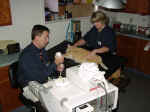 We
went to
dinner and
when we
got back
in the
car, the
phone rang
and the
emergency
clinic
said Marty
wasn't
doing
well.
We drove
there as
quickly as
possible
and by the
time we
arrived,
Marty
could
barely
breathe
due to
having
thrown
another
clot to
his lung,
which
caused his
lung to
collapse.
There was
nothing
that could
be done to
save Marty
and even
if there
had been,
there was
no
assurance
that he
wouldn't
keep
throwing
clots, so
since he
was
suffering
so, we
euthanized
him. We
went to
dinner and
when we
got back
in the
car, the
phone rang
and the
emergency
clinic
said Marty
wasn't
doing
well.
We drove
there as
quickly as
possible
and by the
time we
arrived,
Marty
could
barely
breathe
due to
having
thrown
another
clot to
his lung,
which
caused his
lung to
collapse.
There was
nothing
that could
be done to
save Marty
and even
if there
had been,
there was
no
assurance
that he
wouldn't
keep
throwing
clots, so
since he
was
suffering
so, we
euthanized
him.
Marty
was a
really
sweet cat
and we
still
can't
believe
he's
gone.
It
happened
so
quickly!
Earlier in
the day,
he looked
great at
the vet's
office
during his
ultrasound
(shown
here)...and
a few
hours
later his
lung
collapses
and he
can't
breathe.
We're
grateful
to have
had Marty
in our
lives and
glad that
we
happened
upon him
on East
Washington
when we
did so he
didn't die
of
asphyxiation
and got to
know the
love of a
sibling
and a
wonderful
family for
what seems
like way
too short
a time.
And
Cinnamon?
He lived for awhile in
our rescue
facility...without
his
brother,
without
his mom
& dad
and
without
the child
who used
to love
him and
hold him
near.
The good news is that then he was adopted to a professional women with a really
cute house, one other cat and a good-natured dog, so he's now living the life of
Riley.
Chester
Chester was a frail, very timid long-haired kitty
I found
living
under a
house to
which I
was
delivering
a pizza
while we
were in
the pizza
business.
When I
delivered
the pizza,
I asked
what the
plan was
for the
little
white guy
(he wasn't
4"
long) and
they said
he'd
probably
just live
in the
yard by
the river
with all
the other
strays who
hung
around
their
place.
They told
me that
Chester
was too
afraid to
come out
and hang
with the
other cats
and that
he'd just
been
staying in
the
crawlspace
under the
house.
I knew
that
wasn't
going to
be much of
a life for
him, so I
asked them
if they'd
consider
letting me
adopt
Chester.
They said
yes...for
$25.00.
I went
back and
told Julie
about
Chester
and it was
determined
that we
could keep
him, so I
drove back
the next
day to get
him.
They
weren't
home, so I
left the
money and
a note for
them and
coaxed
Chester
out from
under the
house.
When I
took him
back to
the pizza
place to
show
Julie, she
thought he
was SO
ugly
'cause he
was filthy
dirty,
matted and
covered
with fleas
(it's
amazing
that he
didn't get
heartworm,
which cats
get from
being
bitten by
mosquitoes,
of which
there were
many in
the woods
by the
river).
We took
Chester
home and
stupidly
gave him a
flea bath,
something
which can
be quite
dangerous
for young,
frail,
unhealthy
kittens
infested
with
fleas.
The water
was dark
pink from
all the
fleas and
blood, but
Chester
survived
(no thanks
to us,
probably)
and lived
with us
for many
years.
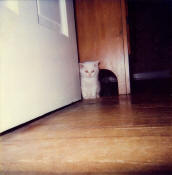 Chester
often got
mats in
his long
hair and
even with
experience,
I once cut
his neck
open while
trying to
remove a
mat.
He never
let out a
peep,
though,
and after
the
stitching
at the
emergency
clinic, he
was high
as a kite
from the
pain
medication
they gave
him.
We always
joked that
that might
have been
the
best...and
worst...day
of
Chester's
life! Chester
often got
mats in
his long
hair and
even with
experience,
I once cut
his neck
open while
trying to
remove a
mat.
He never
let out a
peep,
though,
and after
the
stitching
at the
emergency
clinic, he
was high
as a kite
from the
pain
medication
they gave
him.
We always
joked that
that might
have been
the
best...and
worst...day
of
Chester's
life!
Chester
had a
disgusting
habit some
other cats
do,
too:
he ate
other
cats', uh,
unswallowed,
food.
We joked
that
Chester
loved a
warm
meal.
(Sorry for
that
disgusting
tidbit!
I'm sure
some of
you can
relate, though.)
Chester's
demise was
quite,
quite odd
and is
discussed
in the
"Household
Chemicals,
Environmental
Contaminents
& Dead
Cats"
article
you'll
find a
link to
further
down this
page.
Amazingly,
his brain
lost its
ability to
open and
close his
epiglottis
(the flap
that
covers
your
windpipe
when you
swallow so
nothing
goes down
into your
lungs).
Out of the
blue,
Julie
found
Chester
choking
and
gasping
for air,
none of
which was
getting to
his lungs
due to his
epiglottis
being
closed.
We drove
him to one
of the
area's
most
technologically
advanced
clinics at
speeds
approaching
100 miles
per hour,
where he
was
sedated a
bit so a
breathing
tube could
be passed
into his
trachea.
This
bought us
some time,
so they
x-rayed
Chester
and tried
everything
they could
to figure
out what
had gone
wrong with
him.
A couple
hours
later,
after the
breathing
tube was
removed
and he
came out
of the
sedation a
bit, we
all
decided it
was safe
to take
him home
to see how
he would
do because
he seemed
to be
okay.
Unfortunately,
the
choking
and
gasping
returned
in a
couple
hours and
we
immediately
had to
euthanize
Chester to
end his
suffering.
Like
they say,
when you
can't
breathe,
nothing
else
matters.
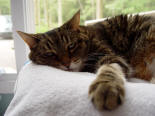 We recently returned to Indianapolis
from a trip to Northbrook, IL, (northwest of Chicago) where we had taken a rescued
kitty for a visit to a veterinary neurologist. The kitty's name (given
to her by the previous owner) is Chenaynay and she has been intermittently
losing the use of her rear legs. Local veterinarians couldn't diagnose
her any further due to a lack of a local neurologist. Unfortunately, the
MRI and spinal tap showed that she has inoperable cancer of the spinal cord at
thoracic vertebrae #3 and #4. We're back home now and Chenaynay is
resting comfortably. Aside from the periodic loss of function of her
rear legs, she looks absolutely normal and healthy, which is amazing given her
circumstance. She's eating like a champ, is using the litter box (even
when she has to drag herself to it) and is still exhibiting plenty of cat-like
behavior. We're monitoring her quality of life very closely and are, of
course, spending lots of extra time with her. She'll tell us when she's
given up the battle. We recently returned to Indianapolis
from a trip to Northbrook, IL, (northwest of Chicago) where we had taken a rescued
kitty for a visit to a veterinary neurologist. The kitty's name (given
to her by the previous owner) is Chenaynay and she has been intermittently
losing the use of her rear legs. Local veterinarians couldn't diagnose
her any further due to a lack of a local neurologist. Unfortunately, the
MRI and spinal tap showed that she has inoperable cancer of the spinal cord at
thoracic vertebrae #3 and #4. We're back home now and Chenaynay is
resting comfortably. Aside from the periodic loss of function of her
rear legs, she looks absolutely normal and healthy, which is amazing given her
circumstance. She's eating like a champ, is using the litter box (even
when she has to drag herself to it) and is still exhibiting plenty of cat-like
behavior. We're monitoring her quality of life very closely and are, of
course, spending lots of extra time with her. She'll tell us when she's
given up the battle.If
you are in the Midwest and have an animal with neurological issues, we feel
good about recommending the doctor Chenaynay visited. If you need his
contact information, please contact us by e-mail.
Update:
Unfortunately, we were forced to
euthanize Chenaynay about a week after returning from our trip out of state. She lost the ability to control her
bowels, bladder and the entire lower half of her body, and it became obvious
to us that she was ready to go. We had our veterinarian come to our
house in the woods, where we had set Chenaynay up on a table looking out at
our pond through her favorite windows, and we petted and talked to Chenaynay
during the 15 minutes or so it took the sedative to take effect. Until
the very end she was enjoying her favorite cardboard scratching pad, but the
rest of her body had simply given up working correctly due to her cancer of
the spinal cord. Shown below is the last picture we took of Chenaynay before the vet arrived.
She looks really out of it, but wasn't; she was enjoying scratching at the
pad. (Click on the the picture to see
a larger version.) We'll see Chenaynay on the other side of the
Rainbow Bridge one day...where she's already whole and happy again.
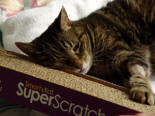
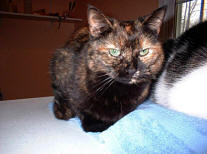 It was interesting how Zorra left
us on 1-12-13. My wife had a birthday the day before and we'd been
tied up with birthday-related dinners and stuff for the previous few days.
The morning after, though she'd been fine up 'til then, Zorra began to
acutely exhibit very labored, rapid breathing. Luckily, our cattery
helper was on duty that morning and saw Zorra's change in respiration.
We quickly got Zorra into the car and took her to our main vet's, where it
was obvious to all of us that Zorra was ready to leave us. She was
given an intra-muscular sedative and, over the next 20 minutes, gently went
deeply asleep. Our vet then administered the injection that ended
Zorra's suffering. It was absolutely peaceful. It was interesting how Zorra left
us on 1-12-13. My wife had a birthday the day before and we'd been
tied up with birthday-related dinners and stuff for the previous few days.
The morning after, though she'd been fine up 'til then, Zorra began to
acutely exhibit very labored, rapid breathing. Luckily, our cattery
helper was on duty that morning and saw Zorra's change in respiration.
We quickly got Zorra into the car and took her to our main vet's, where it
was obvious to all of us that Zorra was ready to leave us. She was
given an intra-muscular sedative and, over the next 20 minutes, gently went
deeply asleep. Our vet then administered the injection that ended
Zorra's suffering. It was absolutely peaceful.
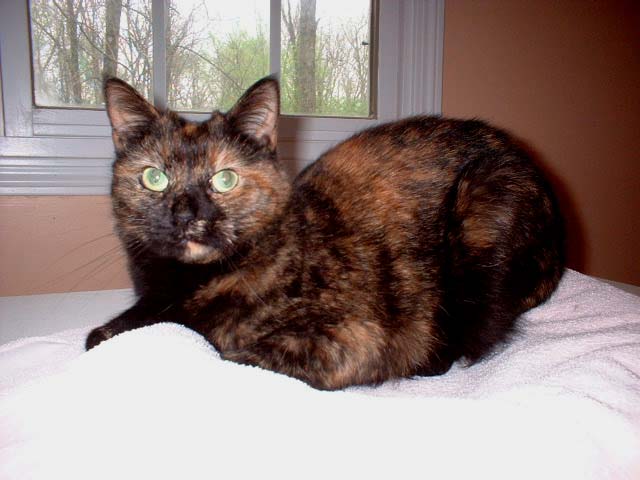 Zorra had been ill for many
years with anemia, cardiomyopathy and renal failure. Julie had given
Zorra thousands of infusions of subcutaneous fluid and had spent countless
hours custom compounding Zorra's many medications (she was on 7 at the time
of her death). Zorra had been ill for many
years with anemia, cardiomyopathy and renal failure. Julie had given
Zorra thousands of infusions of subcutaneous fluid and had spent countless
hours custom compounding Zorra's many medications (she was on 7 at the time
of her death).
We had previously placed Zorra
into two homes: once with JimBob and once with her sister Sally.
Neither stuck and she spent the rest of her life with us. Given all
the daily attention and care our rescued cats receive, she didn't get the
short end of the stick.
Zorra loved to be brushed and
never missed an opportunity to curl up with others, especially large, male
cats. She could often be found in a pile with Harley, Rudy, JimBob,
Tiger, Blackie and others. They miss her terribly, not only because
she would lie with them, but because she would knead on them, which we
called "giving them a massage."
Jake was one of three cats my
father left behind when he unexpectedly passed away in 2007. Jake was
always a large cat, but, due to the stress of being in our rescue facility
and away from my dad, Jake began to put on a lot of weight, ultimately
tipping the scales at 30 pounds. Jake at times exhibited difficulty
breathing, so we took him to our vet, where it was discovered that he had a
lung mass. We kept an eye on the mass over time and it did grow, but
never seemed to get out of hand. One night, while sleeping, I heard my
father's voice. Not a dream, mind you, but just a voice. I did
not see my dad; I just heard his voice say, "It's time, bud. He's
having trouble breathing." (My dad and his brothers called all the
other guys in the family "bud.") Shortly after that, Jake acutely
began to really struggle to breathe, so we were forced to take him to a
24-hour clinic for euthanasia. Unfortunately, Jake was sooooo heavy
that the vets couldn't euthanize him conventionally and Jake really began to
struggle. He ultimately succumbed to what we believe was essentially a
heart attack. It was a very unpleasant experience for Jake...and those
of us who were attempting to help him over to the other side.
Rudy was such a sweet cat.
He had an old soul and we called him The Mayor, as he seemed to sorta be in
charge of our rescue facility. He was very generous, often going
around to give other cats a bath. Other cats loved to curl up with
Rudy. His passing left a big void in the rescue facility's society.
We had once adopted Rudy to an
elderly woman, but when Rudy developed kidney disease and it was obvious he
needed care we could provide him, he came back to us. We were happy to
have him back and to be able to care for him in the manner he required.
His gentle spirit and quiet confidence are missed. :-(
Harley
2003 — August 13, 2015
Harley was one of the most special special-needs cats we've been privileged
to care for. It is my honor to spend some time telling you about
Harley, as he has much to teach us.
Harley's story begins on the
street where I grew up. My father would often work on refinishing and
repairing antiques in the garage and driveway, and had begun to tell me
about a big, friendly, black cat who'd been hanging out with dad. The
problem was, the cat apparently belonged to a fellow with a drinking problem
who lived down the street. My dad expressed concern over the cat's
wellbeing, but then called me in a panic when the drinker told dad, "That
cat's so fat that my two boa constrictors wouldn't even eat him." Oh,
Lord. We made plans for me to rescue the cat the next time an
opportunity presented itself.
Soon, my dad called to say that
the drinker had gone to hang out at the local tavern, so I dropped what I
was doing and jumped into the car for the 40-minute drive over to the old
neighborhood. When I got there, dad was there and had put the garage
door down so the cat couldn't wander off. Being an experienced cat
guy, I thought it'd take couple minutes to get the cat to come to me and I'd
take him to the vet for a checkup and an overnight stay before neutering.
Well, it didn't exactly go that way.
The cat took great delight in
playing hide and seek in the garage. He wasn't feral; he was obviously
just playing hard-to-get with me. Darkness began to fall and dad had
to go open up his pizza shop for the evening, so I stayed in the garage and
spent the next few hours --- in the freezing cold and not dressed for the
occasion --- climbing around in the filthy, crowded, dark loft and trying to
make friends with the cat. By the end of the ordeal I was about ready
to wring the little bugger's neck! After all those hours of hiding in
the loft and elsewhere, he sauntered down and looked at me and meowed from
atop my dad's rolling barbecue grill. The hunt was over.
Here's the garage and the loft,
though back then the loft and garage were full of stuff; it was quite a
sight in there. You can imagine how much fun it was to spend hours
trying to get my hands on the cat, particularly after dark and with no heat.
I could barely feel my feet in my penny loafers! (Click all photos for
larger versions.)

Well, I ultimately did get my
hands on the kitty, who we named Harley (after my father's favorite uncle),
and I did take him straight to the vet clinic, where he proceeded to spray
on our vet's book bag! Here's Harley while he was in the hospital:
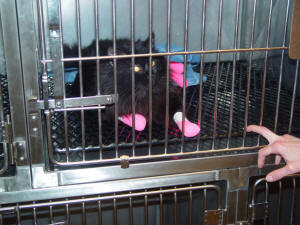
Harley recovered well, then we
introduced him to the rest of our rescued cats, who took to him right away
because of his extremely sweet demeanor.
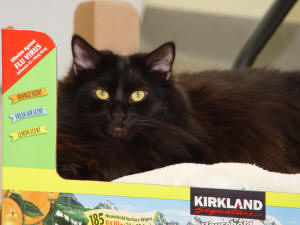
Harley quickly became
everybody's favorite cat to curl up with, as he made a good body pillow!
One of his favorite cats throughout her lifetime was Zorra, shown below
(left) with another of her favorite friends, Tiger. She used to not
only like to lie with Harley; she would knead on him for long stretches at a
time, with Harley loving the massage. We think he got more out of the
kneading than Zorra did.
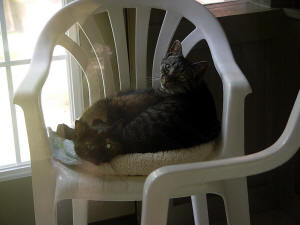
Top to bottom: Harley with
Carlos, Harley with Rudy, Harley with Blackie & JimBob (Harley's best
friend, as you'll learn more about soon) and Harley with JimBob again and
again. Notice JimBob's feeding tube.
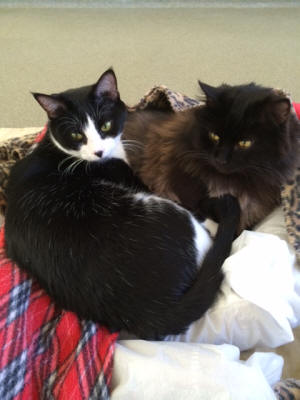
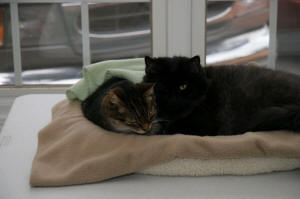
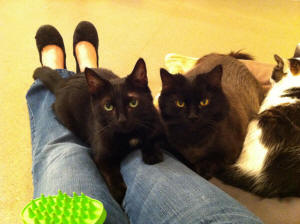
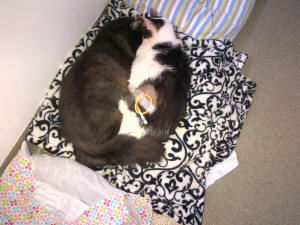
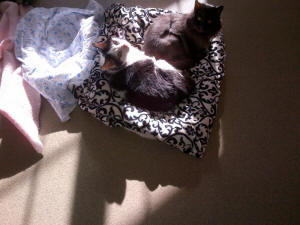
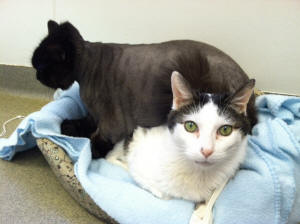
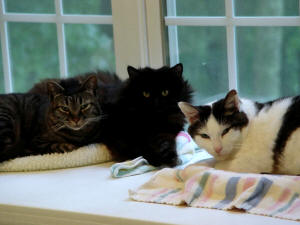
Harley had a habit of hating to
be locked out of rooms. If we needed to close a door to sequester a
cat for the night or give medications or clean, Harley would stand outside
the door crying and "painting" the door with his front paws, much like a dog
would who wanted to have the door opened. It sounds cute to hear
about...and it was, for about the first 15 seconds. After that, it got
pretty maddening!
A number of years ago, Harley
began to have G.I. issues and it was discovered that he had I.B.D. and
megacolon, the latter of which causes a ballooning of the colon, thus
causing stool to stop moving through and to harden. This caused Harley
all sorts of issues, as you can imagine, and multiple times he had to go
under anesthesia to have these obstipations cleared out manually and with
enemas by the veterinarian. It soon became clear that Harley would be
better off to have the offending part of his colon removed, so a subtotal
colectomy was performed. Given his can-do demeanor, Harley took all
this in stride and rejoined the rescue facility family without incident; his
rejoining the clan put everyone at ease, as the missing piece of the puzzle
was back where he should be.
He continued to have some
bowel-related issues throughout his life, but these were well managed with
diet, supplements and medications.
A few years ago, Harley became
very, very ill and diagnostics in Indianapolis and at the Purdue School of
Veterinary Medicine showed that Harley had developed a large cyst around his
kidney. Purdue attempted a groundbreaking surgery to reduce the fluid
build-up. Harley underwent the surgery fine and the procedure went as
planned, but it didn't prove to have the functional benefit we'd all hoped
for, so poor Harley had to undergo another, more involved surgery in
Indianapolis. This surgery worked fine and Harley came through with
flying colors. If you'd like to see two photos taken during surgery to
remove the fluid sack around Harley's kidney, click
here
and here.
These are not all bloody or anything, but are close-ups of Harley's kidney.
They're quite amazing, actually, but may not be everyone's cup of tea.
Here's a poster one of our
rescue facility caregivers did for Harley while he was in the hospital for
his kidney surgeries:
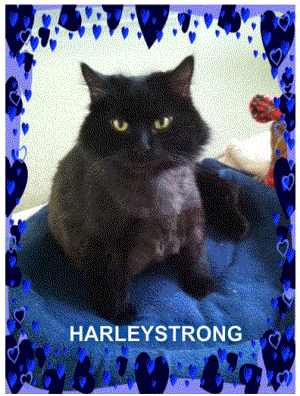
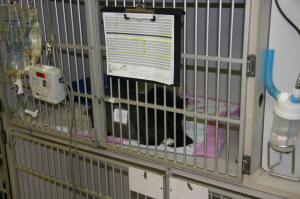
Here's Harley, back home after
the surgeries, looking barely any the worse for wear:
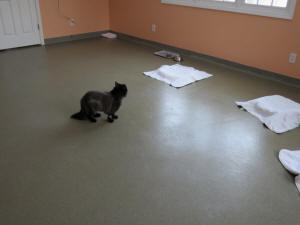
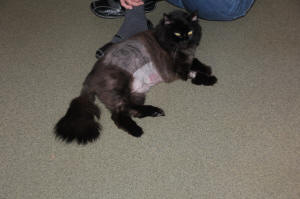
Harley was a large cat when we
rescued him, but gained weight over the years and got to the point where he
was quite sizable, as shown here. The second photo was taken after his
kidney surgery. In case you're wondering, yes, we did ask the surgeon
if he could do a tummy tuck while he was in there. :-)
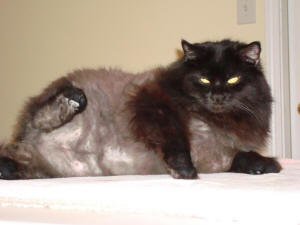
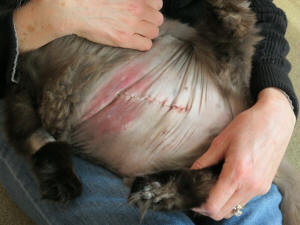
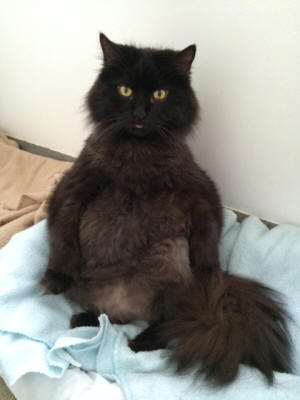
Harley was a gentle giant and
never got into scrapes with other cats. He also liked to do things
that made us refer to him as a big goober, such as climbing into a cabinet
in the rescue facility. My wife, not expecting to find a cat there,
said she just about soiled herself when she looked up and saw Harley hiding
in the cabinet:
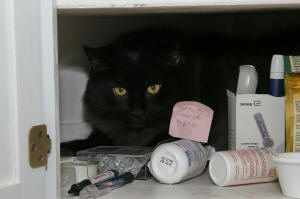
Harley was diagnosed with a
heart murmur and some rhythm issues, so he was put on medication to help
slow his heartrate. As you'll learn in a moment, at the end of his
life we feel that this drug actually worked against him.
About a year from the end of
Harley's life, a caregiver accidentally brought ringworm into the rescue
facility (she was fostering kittens for a rescue group at the time), which
began many months of vet visits, cleaning, isolation, medications, tests and
more for all our rescued animals. We made many adjustments to the
medications and other treatments and, at the urging of one of the
veterinarians, shaved our long-haired cats so as to minimize their fur and
to make topical treatments work better. Below is a photo of Harley
right after he was shaved. Notice how much less friendly he looks with
his facial fur trimmed back! He was still a larger cat, but had lost
weight over the years and was no longer the tub he had once been. He
didn't look as thin in person as he does in the photo, but he had definitely
lost weight.
(Many of our cats got thinner
and healthier when we switched them to a grain-free food,
Blue Buffalo Wilderness cat food, which
we highly recommend. We get it delivered by
www.chewy.com
and appreciate their prices and their service, though we wish they'd pay us
to say so. :-) We've found that what you spend extra on the food
is more than made up for by reduced vet bills.)
It was at the same time that the
veterinarian noted that Harley's kidneys were not working well, so he was
put on yet more medications, plus subcutaneous ("subcu") fluid daily.
He was a real trooper about taking his regimen of pills. He was on
TONS of medications.
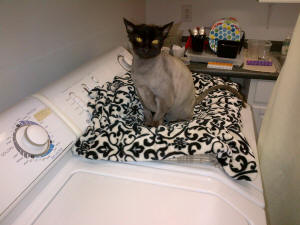
Unfortunately, shortly after the
above photo was taken, Harley began to withdraw, hide under blankets and
face the wall, all of which are sure signs that a cat is ill. We took
him to the veterinarian due to his not eating and his exhibiting labored
breathing. Sadly, an x-ray showed that Harley had a greatly enlarged
heart. Not only that, his kidney values were quite poor; they had
worsened a lot in just the three weeks since the vet diagnosed him with
renal insufficiency. His blood pressure was sky high and he was
terribly anemic. The vet instructed us to take Harley to the local
emergency clinic and specialty center for an immediate echocardiogram and
further tests. We did so and met with the vet, then they admitted
Harley to the hospital.
They performed the
echocardiogram the next day and it showed that Harley had a greatly enlarged
heart, cardiomyopathy, a murmur and fluid collecting around his heart.
He was receiving IV fluid and his usual meds, but nothing else, as the
doctors were discussing what to do.
It was at this point that we
realized that the heart medication he'd been on for some time might have
actually been working against him. His anemia had caused his cells to
be starved for oxygen and his heart was trying to make up for the deficit by
working harder. Normally, Harley's heart would have been beating both
faster and harder, but the heart medication was keeping his heartrate down,
thus all his heart could do was beat harder. This proved to be a very
bad thing.
We visited him that evening and
found him to be much less himself. He was less engaged and it was
apparent he was not feeling well at all. Looking back on the visit and
the photos, we both commented that Harley looked scared. Here are
photos taken of Harley during our visit:
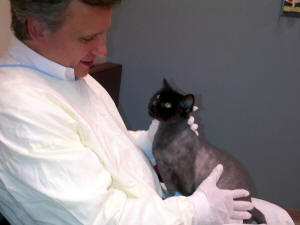
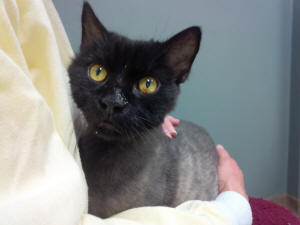
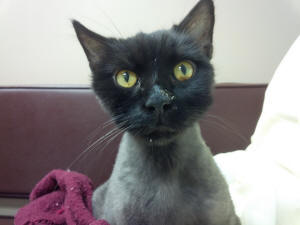
The doctors powwowed and decided
to put Harley on Viagra to open up his blood vessels in an attempt to help
his heart not have to work so hard. They discharged him and we brought
him back to our facility, much to the delight of all the other cats, who
really seemed to have missed Harley. He did well the remainder of the
day, then really seemed to crap out, as if the stress of the day had really
taxed him.
Because of all the vet visits
and such, I had gotten very behind in my work, so I stayed up late that
night. At about 2AM, I poked my head into the room where Harley had
been hanging out, just to check on him. It was dark, so I used a
flashlight to check out the room. At first, I saw two other cats (JimBob
and Tiger), but not Harley, so I was shining my light around the room,
looking for Harley. Then I noticed that he was actually in between
Tiger and JimBob on the dark blanket and had blended right in in the dark.
He was looking around in bewilderment, as if the flashlight's beam was
disorienting to him. I made a clicking sound with my mouth and called
his name, at which time he looked right at me. He was in the sphinx
position and my sense was that he was ok, so I said goodnight to him and the
other boys, then went to bed.
That was the last time I would
see Harley alive.
Despite the late hour, I had
much trouble dozing off and didn't fall asleep until about 4AM. Around
9AM, Julie ran in to tell me that one of our caregivers had found Harley
dead. We ran to the room and found Harley deceased, lying on his side
and partially under the blanket. Incredibly, JimBob was lying by
Harley. He had been with Harley when Harley passed away and he stayed
right next to his best friend for many hours after Harley's passing.
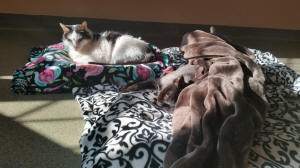
Later, our caregiver put JimBob
on the washer/dryer "table" so he could receive his subcu fluid and his tube
feeding (he had lost his ability to swallow as a side effect of the harsh
medicine he'd received for ringworm). One of our other special-needs
(mostly blind + ear disease) cats, Stevie, was lying in Harley's spot,
waiting for JimBob to take his usual position in the other poofy bed.
The room felt very empty without Harley's presence. To this day (two
days hence), the other cats seem out of sorts and sad. Harley was so
integral to the rescue facility that he leaves an even bigger void than
another cat would.
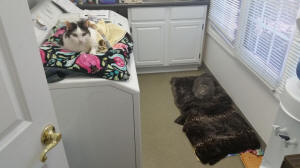
After an animal passes away, we
always reflect on the animal's life and what we learned from their life and
their passing.
From Harley's life we learned to
exhibit grace and poise even in the toughest situations. Harley had an
extremely positive attitude, even when he was very ill or had had surgery.
He just never let anything keep him down. Certainly, we should all try
to be more like brave little Harley in that regard, though we may never
measure up.
From his death we learned to
trust our own instincts about our animals' health. When the emergency
clinic didn't seem to be placing as much urgency on Harley's predicament as
we felt was warranted, and when they didn't give him the oxygen that we
asked about, and when they didn't initiate the Viagra treatment that they
thought might take some burden off Harley's heart, we should have been more
vocal and advocated harder for Harley. Would he have lived? No
one can know, obviously, but there is a chance that he might have.
Heck, if we had known he was going to struggle to breathe and
ultimately pass away, we of course would have euthanized him and saved him
the suffering. The takeaway is that
we urge you to stay rational and objective if you find yourself in a similar
dire circumstance with your animal, but to not let yourself be railroaded by
the medical professionals. If your gut tells you that things aren't
being done that should be done, express your concerns. Stand up
for your animal. They're not only counting on you; their life may
depend on your advocating on their behalf.
Harley, we love you incredibly
and are so blessed to have had you in our lives as long as we did. You
were a very important friend to JimBob, Zorra, Rudy and many other cats
during your lifetime, and they greatly benefited from your friendship and
positive energy. Your passing leaves a big void in our rescue
population and in our hearts, but we know that we'll all be reunited someday
and that your spirit is still with us. You're one of the greatest
ever, Harley. We miss you even more than we thought we would.
We've
been
blessed to
have
loved, and
unfortunately
lost, more animals than just these and
we'll post their pictures
&
stories when we've compiled them. For a bit of an
in-depth case study of how some of these pets came to pass away, visit our
DOWNLOADS
page and check out our article
Household
Chemicals, Environmental Contaminants & Dead Cats. We feel
that every cat owner should be aware of some of the points we raise in the
article, so
please check it
out for the sake of your special friend(s).
A Poem For
Cats
Author Unknown
And
God asked
the feline
spirit
Are you
ready to
come home?
Oh, yes,
quite so,
replied
the
precious
soul
And, as a
cat, I am
most able
To decide
anything
for myself
Are you
coming
then?
asked God.
Soon,
replied
the
whiskered
angel
But I must
come
slowly.
For my
human
friends
are
troubled.
For you
see, they
need me,
quite
certainly.
But don't
they
understand?
asked God
That
you'll
never
leave
them?
That you
souls are
intertwined
for all
eternity?
That
nothing is
created or
destroyed?
It just
is...forever
and ever
and ever.
Eventually
they will
understand,
Replied
the
glorious
cat.
For I will
whisper
into their
hearts
That I am
always
with them
I just
am...forever
and ever
and ever.
Here's a sad story someone found on the
Internet and forwarded to us:
The
Longest
Walk:
A
Day In The Life Of A Humane Society Employee
by Teri Campbell - Reprinted by permission
It is Wednesday afternoon. I make my weekly walk
through our shelter and contemplate the number of animals we'll be able to bring
into here tomorrow. Four cages in the dog's kennel area, two in the isolation
room and three empty cat cages are available. Depending on the size of the
available dogs, it appears as though we'll have nine to thirteen openings this
week. We've had several adoptions in the last few days and are lucky to have
this much space available. It's never enough though...if every single cage were
open it would still not be enough. There are always more unwanted animals than
we can house.
It's Thursday morning now. A morning like every
other morning except for the weekly task that looms before me every Thursday.
You see, part of my job is to go to the Harrison County Animal Control Center
and "choose" animals there to take to our Humane Society
Shelter...animals scheduled to die on Friday morning...more animals than we have
room for.
There is a full house of animals at the Animal
Control Center this week. As I walk down the gravel road that separates our
facilities I can hear them barking and see some of them in their outside cages.
Every single cage is filled to capacity with several animals in each one.
Animals that never asked to be on this earth or in this place.
When I open the door to the kennel area, I am
greeted by a chorus of excited doggy voices. They each seem to beckon me to
"look at me, choose me, love me....."
In run one is a large litter (9) of chow mix
puppies, each one equally adorable. Run two holds a very old Golden Retriever,
two small briar scarred Beagles and a shy German Shepherd. Run three holds four
dogs held for biting and four has two Terrier mix puppies, five shepherd crosses
and a small puppy so mixed in breed no recognizable one can be named.
Run five holds several dogs unavailable for
adoption at this time and six holds twelve different puppies varying in size,
shape and breed. Each one competes for my attention, providing antics to
convince me to pay attention to just them.
As I start down the second side of the shelter,
my heart drops. Run seven holds four confiscated dogs whose owner is being
charged with cruelty to animals. These particular ones have been starved. Two
large, withered Coonhounds and an old shrunken Beagle lay together in the corner
of the cage and a pregnant female Coonhound lies on the outside. The female is
so thin each rib is apparent. Her hair is dull and lifeless as is her eyes. She
barely has the confidence to look me in the eyes and I am glad. I'm glad because
I don't want to see the pain that lives inside of them...glad because I am
ashamed that one of "my kind" did this to her.
Her stomach protrudes awkwardly from her thin
body...almost pulling her to the ground because of her weakened state. Food
bowls are filled to capacity but these animals no longer have the desire to eat
and are so ill the food goes untouched. As I turn to go, the pregnant females
tail slaps ever so slightly against the concrete floor. As cruel and horrific as
mankind has been to her, she still longs for the kind word or soft pet she knows
must be in them.
Runs eight through twelve hold more of the same.
Relinquished pets who aren't "cute" anymore or who ate little Jimmy's
favorite toy. The St. Bernard mix who "got bigger than we expected
(?)" and puppy after puppy whose owners thought they could find a home for
them but couldn't. Puppies who have never known love or a real master and who
for the majority of them, never will. Older dogs ready to die whose owners
either didn't have or wouldn't spend the money it would take to put them to
sleep at a private veterinarians office. I see dogs who are frightened,
depressed and unable to understand why they are here and where their master has
gone...dogs who because they are so withdrawn, will not find a new master in
time.
Now I must "choose". I walk into run
one and bend down to examine the chow mix puppies. When I get to floor level, my
lap is filled with the wiggling, licking puppies. Each lick says thank
you...each glance one of pure adoration. I choose four, two boys and two girls,
choosing simply by sex as each one is equally wonderful.
Many of the animals I am looking at are too sick
to be adopted out and therefore must be passed over by me as well. Their
illnesses are caused oftentimes by the negligent way they were treated before
they came here. Many die of parasites and controllable diseases that could have
been prevented had they only received a little care...a worming or a
vaccination.
In run three I take the two terrier mixes and the
small unrecognizable breed. From run five I take a lab mix puppy, a half grown
German Shepherd and two cocker crosses. I only have two spots left and I've just
finished side one! I retrieve a Boxer mix from run nine and in twelve a Beagle
puppy. I've reached my limit but there are so many more left. The animals look
at me hopefully, wagging their tails and bouncing against the cage fronts.
"Don't leave," they seem to say, "I'll be a good friend to you if
you'll only let me try." I try to avoid their eyes and actions and remain
focused on the fact that I was able to save the thirteen dogs in tow. I try not
to hear their cries...try to pretend they're not back there...the way so many do
when they leave them here.
I enter the cat area expecting the worst and I am
not disappointed. Every cage is filled with every color and age assortment
imaginable. I only have three available cages and there are at least thirty five
animals in these cages. I pick three tiny kittens (I can put them in one cage
and still have two choices left), a large white female about one year old and a
large black and white neutered male whose owners "suddenly developed
allergies."
My two kennel technicians walk over to help bring
our pets to the shelter. Eighteen animals will be taken out of here by us this
week (an unusually large amount) and we are still leaving over fifty animals
behind that are available for adoption. Why can't we make people realize there
is absolutely no reason to let their animals breed indiscriminately? I only wish
they could see what we see every week of every year.
We take our charges to the shelter and settle
them in their new temporary homes. Each one is given a raised platform or a soft
carpet to lie on, a full food dish and fresh water, a chew and a toy or two.
Shots and worm medicine are administered and baths are given. It's been a long
day for us all. The animals settle into their new surroundings and we go home.
It's Friday now. If possible this day is often
worse than the last. This is the day of the week that the animals we left behind
are killed. We drive our cars by the closed facility and try not to imagine what
is happening inside. Before long, we can hear the doors open and a thudding
sound...a sound we know all too well. You see, this is the sound of their now
lifeless bodies hitting the bottom of the truck that will take them to their
final stop. The sound of the many creatures who only yesterday looked to me for
comfort...who asked me to choose them...who only wanted one last chance.
I try very hard to focus on the good we do. I
don't want to downplay the tremendous effort it takes to save and place the many
animals we have, but I cannot forget the ones I didn't save...the occupants of
the truck that leaves the Animal Control Center every week.
I walk back to the dog runs and view our newest
arrivals. Everyone has had their cage cleaned, eaten breakfast and are now
napping or pulling on their littermate's tail. I bend down to the little Beagle
I just brought in. She gratefully licks my hand and then my cheek. Her eyes are
so full of adoration and gratefulness. I try to look past the tears in my own
and for one moment forget that I'll have to do this again next week.
TUESDAY, SEPTEMBER 11TH,
2001, WAS A BUSY DAY
FOR THE ANIMALS IN HEAVEN
We received the following via e-mail and thought it was appropriate to post
here on our site. We're sure it'll tug at your heartstrings as it did
ours.
 WELCOME AT RAINBOW
BRIDGE WELCOME AT RAINBOW
BRIDGE
by AlexanderTheodore Bouvier, Fourth Year Resident
On the morning of
September 11, 2001, there was an unprecedented amount of activity at the Rainbow
Bridge.
Decisions had to be made. They had to be made quickly. And they were!
An issue not often addressed here in Heaven at the Rainbow Bridge is the fact
that many residents really have no loved one for whom to wait. Think of the pups
who lived and died in hideous puppy mills: no one on earth loved or
protected them. What about the many who spent unhappy lives tied in backyards?
And, the ones who were abused. Who are they to wait for?
We don't talk about that much up here. We share our loved ones as they arrive,
happy to do so. But we all know there is nothing like having your very own
person who thinks you're the most special pup in Heaven.
Tuesday, September 11th, a request rang out for pups who were not waiting for specific loved
ones to please volunteer for a special assignment. An eager, curious crowd surged
excitedly forward, each pup wondering what the assignment would be.
They were told by a solemn voice that unexpectedly and all at once over 4,000
loving people had left Earth long before they were ready. All the pups, as pups
do, felt the humans' pain deep in their own hearts. Without hearing more, there
was a clamoring among them ..... "May I have one to comfort?"
"I'll take two, I have a big heart." "I've been saving
kisses forever."
One after another they came forward begging for assignment. One cozy-looking
fluffy pup hesitantly asked, "Are there any children coming? I would be
very comforting for a child 'cause I'm soft and squishy and I always wanted to
be hugged."
A group of Dalmatians came forward asking to meet the Firemen and be their
friends. The larger working breeds offered to greet the Police Officers and make
them feel at home. Little dogs volunteered to do what they do best: cuddle and
kiss.
Dogs who on Earth had never had a kind word or a pat on the head, stepped
forward and said, "I will love any human who needs love." Then all the
dogs, wherever on Earth they originally came from, rushed to the Rainbow
Bridge
and stood waiting, overflowing with love to share --- each tail wagging an
American Flag.

|
